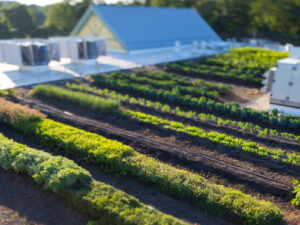
The Quiet Gardeners, Portraits of South Africa’s After-Hours Urban Farmers
In a city like Johannesburg, the night belongs to cars. Taxi horns. Quiet deals. Headlights on wet tar. But if you look closer, really look, you’ll find smaller stories growing in between all that concrete. On the rooftop of a worn-down building in Hillbrow, under dim security lights, a man in a security guard’s jacket moves quietly among rows of spinach and coriander. It’s just after midnight. His radio crackles in the pocket of his jacket. One ear listens for trouble. The other is tuned to the sound of water trickling from a small plastic can.
His name is Mpho, and by day, no one would guess. To most of the people who pass him at the building entrance, residents, courier drivers, the occasional policeman, he’s just the night guard. But for the past two years, Mpho has been quietly cultivating his own rooftop garden. Not for Instagram. Not for market sales. Just to have something real growing where there was once nothing. “It helps me stay awake,” he says, wiping dust from his hands. “But also… it makes the place feel alive. Not everything in Hillbrow must be broken.”
He’s not the only one. Across South African cities, Cape Town, Durban, Pretoria, there’s a quiet, slow-growing community of after-hours urban farmers. They aren’t full-time agricultural experts. They’re security guards, taxi marshals, night-shift workers, and building caretakers. People who start their gardening when everyone else has locked their doors. It’s not a movement with official hashtags. It’s not a social media trend. If anything, most of these gardens exist specifically off-grid, on rooftops, down alleyways, in cleared spaces behind panel-beating shops. Places no one pays attention to during the day.
In Salt River, Cape Town, a woman named Mariam keeps a tomato plant alive next to her late-night spaza shop window. By 3 a.m., there’s usually a group of younger guys hanging around buying cigarettes and drinks. The tomatoes aren’t for sale. “I just like seeing something green there,” she says. “Even if it’s small.” Why here? Why now? It’s partly practical. For people working irregular hours, late-night gardening gives them something quiet to focus on between shifts. It’s meditative. It’s about staying awake without constantly scrolling through a phone.
But there’s also something deeper. A kind of quiet resistance to the noise and hardness of city life. Growing spinach or basil in a place like downtown Durban isn’t going to change the world. But for the person tending it, it creates a pocket of calm. That’s how Thabiso in Pretoria puts it. He’s a minibus driver during the day, but his building’s caretaker by night. His patch is a mix of chilli plants and lemon trees growing in repurposed tyres and paint buckets. “During COVID,” he says, “everyone was scared. I started growing things because it felt like one thing I could control. Now I can’t stop.”
 There are bigger urban farming projects in South Africa, of course. Official ones. Community gardens backed by NGOs or municipalities. But those feel different. Organised. Branded. The kind of gardens Mpho or Mariam or Thabiso keep alive don’t need a signboard. They don’t ask for permission. They just exist quietly. Most of these rooftop farmers use what they have, recycled Coke bottles for seedling trays, leftover rainwater caught in buckets, compost made from shop off-cuts. It’s not glamorous. But there’s a sharp kind of pride when they show you.
There are bigger urban farming projects in South Africa, of course. Official ones. Community gardens backed by NGOs or municipalities. But those feel different. Organised. Branded. The kind of gardens Mpho or Mariam or Thabiso keep alive don’t need a signboard. They don’t ask for permission. They just exist quietly. Most of these rooftop farmers use what they have, recycled Coke bottles for seedling trays, leftover rainwater caught in buckets, compost made from shop off-cuts. It’s not glamorous. But there’s a sharp kind of pride when they show you.
Mpho’s spinach isn’t Instagram-ready. The leaves are rough-edged, some yellowed. But when he pulls one off and holds it up against the skyline, Hillbrow’s tower blocks in the background, it feels like something rare. “People come and go here all the time,” he says. “But these plants… I planted them. I know when they started.” Not every garden lasts. Buildings change owners. Rooftops get locked. Security jobs shift. A garden that was there one week might be gone the next. Still, there’s always another one starting somewhere else.
In Newtown, there’s a stretch of old train yard fences where beans and pumpkins climb up like they were meant to be there. No one’s quite sure who planted them. Probably one of the guys who does night patrols. Someone always has seeds in their pocket. There’s also something human about it that doesn’t show up in official reports. These gardens create small moments of community, especially among night-shift workers who don’t see each other otherwise.
At 2 a.m. on a Sunday, it’s not unusual for two strangers, one a taxi driver finishing late, the other a security guard starting early, to pause by the same rooftop or alley garden, comment on how the beans are doing, maybe swap advice. “Chilli plants don’t like too much water,” one will say. The other will nod, tucking that away for later. None of this gets posted online. No one’s tracking it. But it’s there, woven into the nighttime fabric of South African cities.
Back in Hillbrow, as dawn starts to creep in pale across the sky, Mpho finishes his final round. He checks the locks. Radios in. One last glance at the spinach before heading downstairs. “People don’t notice,” he says quietly. “But it makes me happy.”
A small thing. But in cities like Johannesburg, Durban, Cape Town, small things growing where they’re not expected have always mattered.




